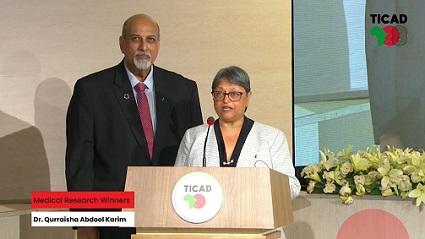The Fourth Hideyo Noguchi Africa Prize Award Ceremony Remarks by Laureates of Medical Research Category
[Remarks] Laureates of Medical Research Category
Dr. Salim S. Abdool Karim and Dr. Quarraisha Abdool Karim(Republic of South Africa (RSA))

Dr. Quarraisha Abdool Karim
Honourable Heads of States, Heads of Delegations, Excellencies and Distinguished Guests
It is with humility that Salim and I jointly accept this distinguished and singular honour of receiving the 4th Hideyo Noguchi Africa Prize. We do so on behalf of the large CAPRISA research group of over 300 that we lead, our partners and collaborators across the world, our research funders and most importantly the thousands of people who have volunteered to participate in our studies in South Africa. We thank our families and mentors for all their guidance and support over many decades.
Covid-19 has reminded us as a global community of our inter-connectedness, shared responsibility and shared vulnerability. We are all dependent on each other. The pandemic has reminded us of the importance of science and investments in science for the betterment of humanity.
As we grappled with the Covid-19 response, scientific research and development gave us vaccines that brought us much-needed hope when there was such turmoil, fear and anxiety. We have seen in Africa how past research investments in HIV, TB, Malaria and Ebola built critical clinical and laboratory capabilities that enabled us to pivot more rapidly to respond to Covid-19. But we have also learnt again that we need to invest in science and innovation on our continent so that we in Africa do not have to wait at the back of queue as we had to for Covid-19 vaccines and treatments.
Scientific capacity building is a time-consuming process and requires building research institutions with a long-term perspective. For it is these institutions that provide the scientific discoveries which are an important first step to new technologies as well as evidence-based policy and programmes.
But translating research discoveries into products is the hurdle we continue to work on overcoming so that those who are most in need will reap the benefits of scientific solutions. For it is only when our research changes the lives of the most vulnerable for the better that we know that our research is having an impact. Science offers us one more opportunity to unleash the full potential of Africa for a better future for all.
Dr. Salim Abdool Karim
33 years ago, we made an important observation that defined much of our research – that young women bear the brunt of the HIV epidemic in Africa. Young women had about 4 times more infection that their male counterparts - this set us on the path to develop and test new technologies to reduce the risk of HIV in young women. After 18 years of failure after failure, we became known as the “experts in failure”. But, there is no quick success in science. In the same way that the great Nelson Mandela said that it is “a long walk to freedom”, we have found that is also a “long walk” over many years to achieve impactful scientific breakthroughs. And it is through each failure and the occasional advance that we walk one more step closer to success.
But it took just one success, when in 2010, we announced to a standing ovation at the International AIDS Conference in Vienna that we had shown that topical tenofovir reduced the risk of HIV in women. Finally, an HIV technology that empowered women – that they could use and control for themselves. It served as the foundation of a new way of preventing sexual transmission of HIV, known as Pre-exposure prophylaxis or PrEP for short. But this was just the start for us – we have worked tirelessly making several more discoveries (and failures) that are helping us and others move closer to an improved form of PrEP that can change the course of the HIV epidemic in Africa. So, excellence in science is alive and well in Africa!
I would take this opportunity to recognise the honorable Minister Naledi Pandor from South Africa for her support of our research over many years going back to when she was Minister of Science and Technology. I would also like to express our gratitude and appreciation for Japan’s ongoing contributions to science and technology. As African scientists, we have had the pleasure of visiting some of Japan’s many great science institutions – there is much we have learnt and can still learn from each other.
In closing, we would like to acknowledge and thank the Japanese government, the African Union, African CDC, the South African government and the many African governments that have helped build science on our beloved continent. May this Hideyo Noguchi Africa Prize inspire our youth to pursue careers in science to improve lives in Africa and globally.
Thank you.
